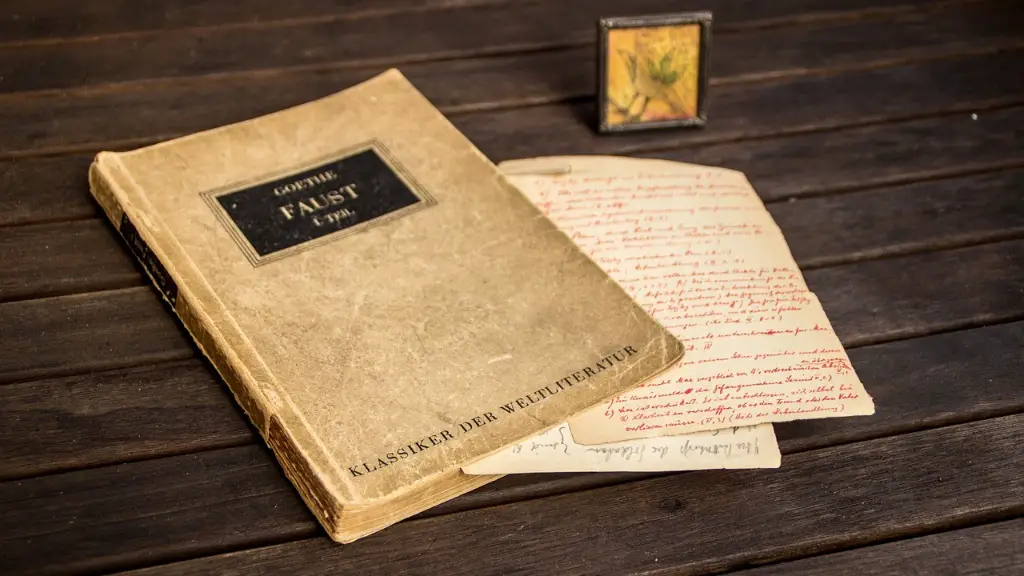Poetry is a fundamental part of many cultures, with its origins pre-dating written language. It is a form of literature that uses aesthetic and rhythmic qualities of language to evoke meanings beyond the literal ones. It has been enriched by many cultures at different times and has always been a great way to express emotional and spiritual truths.
Poetry can be divided into several different forms, each containing its own set of elements. These forms include narrative poetry, lyrical poetry, pastoral poetry, ode, sonnet, haiku and other forms. Within each of these forms, there is an understanding of the poetic language, expert crafting and elements of theme and structure.
A poet is defined as someone who writes poetry. Although the art of writing poetry has been a part of many cultures for centuries, some believe that professional poets only enter the scene in the past century or two. Professional poets are largely those who write for publication and for money, although many poet-writers practice the art of poetry simply for personal enjoyment.
Having said that, all poets share a common bond in that it is the inner voice that drives the writing. It is this inner voice which enables them to create beauty from words and to express their deepest feelings. Although poets may come from all walks of life, they all need a certain degree of creativity and sensitivity to feel and express the emotion that drives the poem.
Poetry is also a craft and an art form, and poets need to understand the structure, grammar and syntax of the language they are using. A great poem often requires an understanding of the craft of writing; this craft relies on an understanding of form, sound, and rhyme. A poet needs to be creative and demonstrate a mastery of technique to convey the desired emotion.
In addition to having the creativity and understanding of the technique, the poet needs to be able to convey the emotion and the idea behind the poem. The best poets will be able to not just tell the story, but to make the reader feel the emotion and understand the idea without having to say it.
Style
The range of poetic styles is endless, as every poet will have their own individual style. Some poets prefer to write in traditional styles, in which the form, sound and structure come before the words. Others prefer to write in a more experimental, unconventional style, which leads to the words leading the way and the structure and form following.
The style of a poet may be determined by their background or the type of experience they have had with language. The style can encompass all aspects of the poem from the choice of words to the images created. Even the way in which the poem is presented, either orally or in a written form, will greatly influence how the reader perceives it.
Appeal
Poetry appeals to so many people because of its emotive power. Good poems can be meaningful and personal, and make the reader reflect on their circumstances in life. In the words of Maya Angelou: “Poetry is a little piece of life you can hold in your hand.”
The ability to evoke emotion, convey a story and create imagery, connect with the reader on multiple levels. There are also underlying themes and messages in each poem, which can help the reader make sense of their own experiences. Poetry appeals to people of all backgrounds, ages and cultures, as its universal messages can be interpreted differently by each person.
Audio Poetry
Audio poetry is a type of performance poetry. This type of poetry is usually performed in a recorded format and incorporates music, voice, and sometimes visuals. These performances are often created to accentuate the emotions and meaning in the poem.
Audio poetry has become increasingly popular as performers move away from more traditional forms. The appeal of audio poetry is that it allows a poet to not only tell their poem, but also interpret it in an aesthetic manner. These performances sometimes transcend language and even national boundaries as people connect to the emotions and energy of the poem, rather than simply its literal meaning.
The Role Of Poets
The role of the poet is to provide society with a voice. They help to create a safe space where people can examine and express their own emotions, experiences and opinions. A good poem can capture the thoughts, feelings and ideas that words alone cannot.
Poets also have the unique ability to bring the important issues of the day to light. They can give a voice to the voiceless and uncover hidden truths. By writing about their observations, experiences and feelings, poets can create a platform for meaningful dialogue about the issues that matter most.
In Summary
In summary, poetry has been a part of many cultures for centuries. A poet is someone who writes poetry and a great poem often requires an understanding of the craft of writing; this craft relies on an understanding of form, sound, and rhyme.
The range of poetic styles is endless, as every poet will have their own individual style. Poetry appeals to so many people because of its emotive power. Audio poetry is a type of performance poetry which has become increasingly popular.
The role of the poet is to provide society with a voice. They help to create a safe space where people can examine and express their own emotions, experiences and opinions. Poets also have the unique ability to bring the important issues of the day to light.

